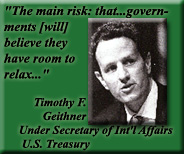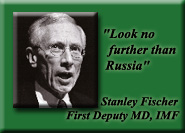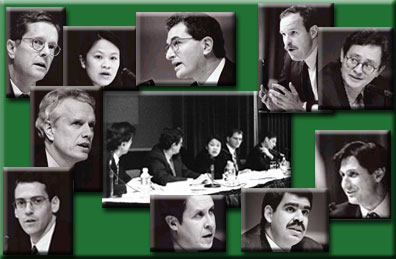1999 Annual Meeting
Approximately 400 members and guests attended EMTA’s Annual Meeting on December 9, 1999,  which was held at the offices of Salomon Smith Barney in New York City. Keynote addresses were delivered by Timothy F. Geithner, Under Secretary of International Affairs at the U.S. Treasury, and Stanley Fischer, First Deputy Managing Director of the International Monetary Fund.
which was held at the offices of Salomon Smith Barney in New York City. Keynote addresses were delivered by Timothy F. Geithner, Under Secretary of International Affairs at the U.S. Treasury, and Stanley Fischer, First Deputy Managing Director of the International Monetary Fund.
Mr. Geithner’s speech focused on three major challenges for the international financial agenda: (1) how to reduce the vulnerability of Emerging Market economies to the risks of today’s innovative capital markets, (2) how to create a system of more stable flows of capital to Emerging Markets and (3) how to strengthen the capacity to catalyze market-based solutions to financial crises.
Market-based solutions for financial crises would require, according to Mr. Geithner, “[that] the official community...be prepared to provide finance to Emerging Market economies...But it will not be realistic for the markets to expect the official community to provide finance on a scale...substantial relative to the total external obligations of the country.”
Importantly, Mr. Geithner noted that, “The main risks today. . .are that the apparent improvement in the outlook will diminish the momentum for reform and encourage those governments to believe they have room to relax...Probably the most important lesson of the last decade is that governments, in Emerging Market economies in particular, need to plan for the worst; . . .not to make policy on the expectation that we in the G7 or the IMF will succeed in creating a world of fewer or less severe shocks or a more viable cushion against crises.”
Mr. Fischer also addressed the roles of the public and private sectors. Specifically referring to EMTA’s policy paper “Is Burden-Sharing Being Pushed Too Far?”, he commented that “We surely have a common interest in many aspects of reform in this area, as well as other parts of the international financial architecture.” Reviewing the Romania, Ukraine, Ecuador and Pakistan case histories, Mr. Fischer noted that “We are in the process of drawing lessons from the experience.”
Mr. Fischer stated that “the first priority for the Fund and the Emerging Market nations [was] crisis prevention,” which includes, “promoting sound economic and regulatory policies, ensuring effective...regulation of financial systems and improving transparency.”
Lastly, Mr. Fischer spoke about several reasons for involving the private sector in crisis resolution. First, he noted that, although there was little evidence that it had contributed to the Asian crisis in general, “moral hazard exists, and for a clear example of the dangers that it poses, look no further than Russia. Many investors thought that Russia was too big to fail.” The second reason, he noted, was that “the IMF does not have enough money to ensure that countries can always service their debts.”
For a copy of Mr. Fischer's remarks click here.
Panel Discussions
Two panel discussions on the Economic Outlook and Investor Perspectives in 2000 preceded the keynote ad-dresses. Jose Luis Daza (J.P. Morgan) moderated the Sell-Side panel, which included Joyce Chang (Chase Securities), Paulo  Leme (Goldman Sachs), Arturo Porzecanski (ING Barings) and Tulio Vera (Merrill Lynch). Tom Trebat (Salomon Smith Barney) moderated the Buy-Side panel composed of James Barrineau (Alliance Capi-tal), Mark Siegel (Mass Mutual), Stuart Waugh (Mitchell Hutchins) and Mohamed El-Erian (PIMCO). Most Sell-Siders expressed optimism that crossover investors would continue to return to the market, and that growth in Emerging Markets countries would be the dominant force in the market in 2000. The speakers also forecasted (correctly as it turned out) that Y2K would be a non-event in the Emerging Markets. Finally, the panelists discussed the industry’s confusion over IMF policy vis-à-vis the Emerging Markets countries, with some speakers urging that the Several Buy-Side panelists commented that, despite positive credit fundamentals generally, the strong performance of Emerging Markets debt in 1999 would be hard to repeat in 2000. With some qualifications, they rejected the suggestion that Emerging Markets debt was a dying asset class, and instead highlighted the continued benefits for crossover investors. Finally, panelists agreed that Ecuador’s negotiations with creditors and the IMF would be "prolonged, messy and complex," but stated that, as official sector policy concerning burden-sharing remains unclear, firms are treating Ecuador as a special situation rather than changing their investment policies generally. Fund’s policies be more clearly spelled out. Mr. Daza noted that the Sell-Side panel’s consensus forecast at last year’s Annual Meeting for the end-year 1999 EMBI was right on target.
Leme (Goldman Sachs), Arturo Porzecanski (ING Barings) and Tulio Vera (Merrill Lynch). Tom Trebat (Salomon Smith Barney) moderated the Buy-Side panel composed of James Barrineau (Alliance Capi-tal), Mark Siegel (Mass Mutual), Stuart Waugh (Mitchell Hutchins) and Mohamed El-Erian (PIMCO). Most Sell-Siders expressed optimism that crossover investors would continue to return to the market, and that growth in Emerging Markets countries would be the dominant force in the market in 2000. The speakers also forecasted (correctly as it turned out) that Y2K would be a non-event in the Emerging Markets. Finally, the panelists discussed the industry’s confusion over IMF policy vis-à-vis the Emerging Markets countries, with some speakers urging that the Several Buy-Side panelists commented that, despite positive credit fundamentals generally, the strong performance of Emerging Markets debt in 1999 would be hard to repeat in 2000. With some qualifications, they rejected the suggestion that Emerging Markets debt was a dying asset class, and instead highlighted the continued benefits for crossover investors. Finally, panelists agreed that Ecuador’s negotiations with creditors and the IMF would be "prolonged, messy and complex," but stated that, as official sector policy concerning burden-sharing remains unclear, firms are treating Ecuador as a special situation rather than changing their investment policies generally. Fund’s policies be more clearly spelled out. Mr. Daza noted that the Sell-Side panel’s consensus forecast at last year’s Annual Meeting for the end-year 1999 EMBI was right on target.